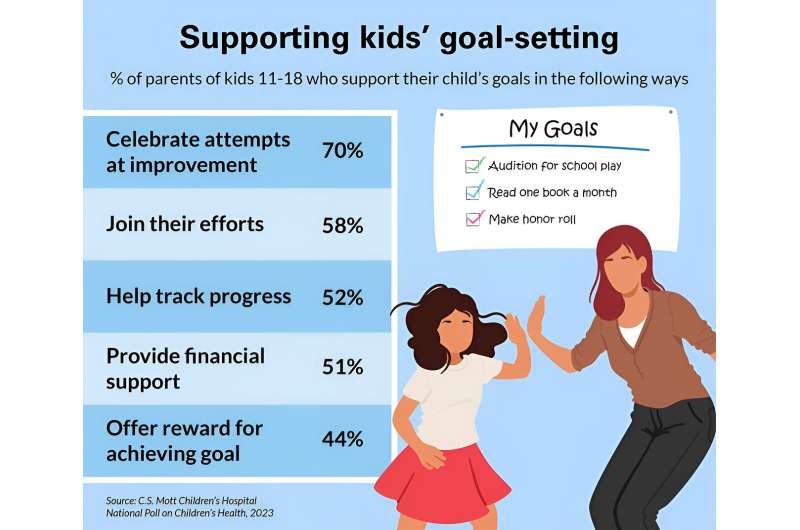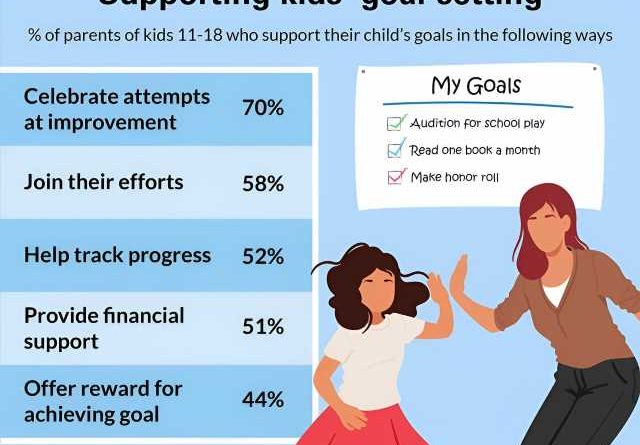Parents top resolutions: More patience, less time on phones

Among many parents’ top resolutions for the New Year: More patience, less time on phones, better consistency with discipline and healthier family habits.
Their tweens and teens are setting goals too—including achievements related to grades and school, success in an activity, exercise and nutrition and earning money, according to the University of Michigan Health C.S. Mott Children’s Hospital National Poll on Children’s Health.
Nearly three in four parents polled report making resolutions or setting personal goals throughout the year, with a quarter of them hitting the reset button as the clock strikes midnight for the next calendar year. A smaller number choose to wipe a clean slate at the start of the school year or on a birthday.
Over half of parents say that their child ages 11–18 years has set personal goals as well, according to the nationally representative poll based on 2,044 responses from parents of children ages 0–18 surveyed in August 2023.
“Milestone occasions, such as the start of a new calendar or school year, present families with opportunities for self-reflection and motivation to improve an area of physical and emotional health,” said Mott Poll co-director Sarah Clark, M.P.H.
“Our poll suggests that parents often focus on areas they’d like to improve in their parenting approach, including being more engaged, focusing on their own and their child’s health, and supporting their child’s connection to the broader community.”
Nearly half of mothers and a third of fathers said they have made goals to change something about their parenting, with more than three quarters striving to have more patience and more than half wishing to spend less time on their phone.
Some parents set health-related goals, too, with nearly half vowing to provide healthier meals and snacks and more than a third planning to exercise with their child.
Among those who have set parenting goals, roughly three quarters feel it has helped make them a better parent and even more believe that it has helped their child learn how to work toward a goal.
“Setting goals to improve parenting can help parents define their values and priorities and have positive effects on the health and well being of the whole family,” Clark said.
Parents with three or more children in the household are also more likely to set goals about being consistent with discipline and involving their children in spiritual activities, compared to parents with fewer children, the poll suggests.
Kids have resolutions too
When it comes to children’s goals, nearly 70% are related to grades and school performance while a little more half of kids want to succeed at an activity. Roughly two in five kids are focused on exercise, eating habits and nutrition and earning money while more than a third would like to try something new. Less than a quarter of goals included friendship or volunteering.
According to parents, teens ages 15–18 more often cited goals related to nutrition and exercise while exploring something new is more common among children 11–14 years.
“Goal-setting helps kids learn to be accountable for their actions and develop a growth mindset,” Clark said. “Parents modeling goal setting can also teach kids the importance of working toward something and learning from mistakes along the way.”
Celebrating success
Parents shared different ways they support their kids in their goals. Most say they celebrate their child’s attempt at improving while more than half join their child in working toward the goal.
Others help track their kids’ progress, provide financial support or offer a reward for meeting their goal.
“Taking steps to encourage goal-setting is a great way for parents to show their support and confidence in their child,” Clark said.
Parents may want to identify specific strategies to enhance their ability to achieve their goal, she recommends.
“We all know how commonly people set New Year resolutions that fade as the year goes on,” Clark said.
“If families are serious about sticking to resolutions, it’s essential to set specific and realistic targets and schedule time to take necessary steps to reach them.”
Source: Read Full Article
